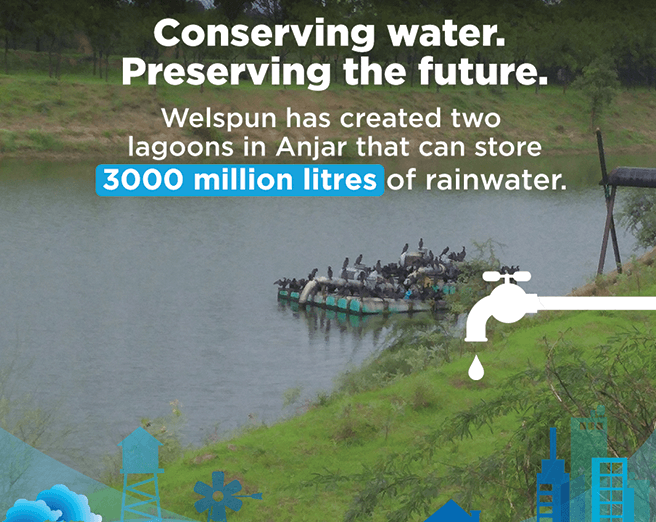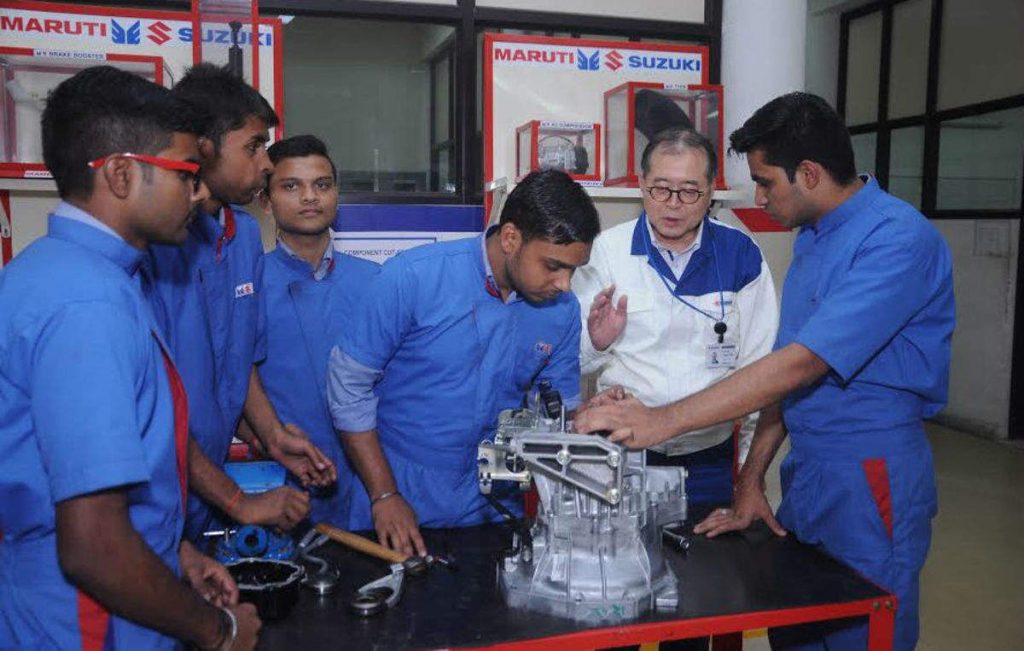

Businesses are vehicles of economic forces, and economic forces affect not just a region’s economy but also its socio-economic fabric, culture and environment. Take, for instance, the example of India’s textile industry. The sector contributes nearly 2 per cent to the country’s GDP every year – while using millions of litres of water, providing employment to over 45 million people, and engaging a large share of the farming and agricultural sectors. This highlights why businesses, regardless of the sector they operate, must move beyond just business responsibilities to become more aware of their responsibilities to the lives and aspects that they impact, directly and indirectly.
Given such deep enmeshment, small improvements made at the grassroots level can push the entire ecosystem towards a sustainable, progressive and prosperous future. As Larry Fink, the CEO of Blackrock, puts it: “To prosper over time, every company must not only deliver financial performance but also show how it makes a positive contribution to society.”
Here, then, is my take on the ‘why’ and ‘how’ of the intersection of sustainability, environment and business operations.
Towards Sustainability: Minimising the Environmental Footprint
 The world is on the brink of a climate crisis. Without timely interventions to mitigate the environmental damage, we will cross the point of no return within the next two decades. But doing so requires seamless collaboration between multiple stakeholders globally, including governments, industries, individuals and regulatory bodies – something that is difficult to achieve at the best of times.
The world is on the brink of a climate crisis. Without timely interventions to mitigate the environmental damage, we will cross the point of no return within the next two decades. But doing so requires seamless collaboration between multiple stakeholders globally, including governments, industries, individuals and regulatory bodies – something that is difficult to achieve at the best of times.
From talent to capital to resources, organisations share a lot with the societies and communities they operate. Each unit of profit made incurs a debt to society that must be repaid. The first step in this direction is to create deeper, more measurable linkages between business growth and social growth. For instance, have the income levels of the target communities or their quality of life gone up because of the intervention? Do the communities now have access to an essential service or facility that they did not before?
Enterprises can and must step in to play a more active role in environmental conservation and rejuvenation. Why? Because they depend on natural resources for raw materials, the physical space in which to set up operations, and everything in between and beyond. Saving the environment is in their long-term favour. Further, their involvement can help break down one big task – saving the environment – into smaller, more achievable milestones.
For instance, Havells decided to stop using KR-85 radioactive isotope in its ceramic metal halide (CMH) lighting range and invested in sustainability initiatives such as zero-water  discharge, renewable energy and resource conservation across all its plants. Welspun has done something similar at its manufacturing facilities in Anjar and Vapi, achieving zero freshwater intake by processing wastewater discharge from nearby districts. This is important because these areas face an acute shortage of fresh water for long stretches throughout the year.
discharge, renewable energy and resource conservation across all its plants. Welspun has done something similar at its manufacturing facilities in Anjar and Vapi, achieving zero freshwater intake by processing wastewater discharge from nearby districts. This is important because these areas face an acute shortage of fresh water for long stretches throughout the year.
Why are these initiatives successful? Because they identified how their core operational facets impact the environment and communities before implementing measures to minimise them.
The simple truth is that a good governance mechanism – both internal and external facing – can create smart, ethical, and responsible business practices. This, in turn, can give the organisation the power to create long-term value.
Towards Equity: Bridging the Socio-Economic Divide

From talent to capital to resources, organisations share a lot with the societies and communities they operate. Each unit of profit made incurs a debt to society that must be repaid. The first step in this direction is to create deeper, more measurable linkages between business growth and social growth. For instance, have the income levels of the target communities or their quality of life gone up because of the intervention? Do the communities now have access to an essential service or facility that they did not before? Evaluating social initiatives on these measures can help enterprises create and deploy CSR projects with a clear roadmap.
 Maruti Suzuki, for instance, offers scholarships to meritorious students from economically weaker sections of society. It has set up several driving schools and is working on increasing its roster of industrial training institutes to enhance the employability of underprivileged youth. At Welspun, we routinely roll out skilling initiatives to empower women across all verticals within the organisation while training prospective candidates from the country’s top B-schools under our career acceleration and internship programmes. We also launched our Women of Welspun initiative to drive a diverse and inclusive environment for all. Additionally, we have also curated a programme like Manthan to encourage members across departments and units to bring innovative ideas to the table.
Maruti Suzuki, for instance, offers scholarships to meritorious students from economically weaker sections of society. It has set up several driving schools and is working on increasing its roster of industrial training institutes to enhance the employability of underprivileged youth. At Welspun, we routinely roll out skilling initiatives to empower women across all verticals within the organisation while training prospective candidates from the country’s top B-schools under our career acceleration and internship programmes. We also launched our Women of Welspun initiative to drive a diverse and inclusive environment for all. Additionally, we have also curated a programme like Manthan to encourage members across departments and units to bring innovative ideas to the table.
By adopting such approaches, enterprises can become the catalysts of upward social mobility across gender, caste, economic, regional and religious spectra. This is especially important in a country as diverse as India, where limiting the focus of progressive policies to the bare minimum can hinder the pace of development. Revolution, as with charity, begins at home – and the world today could use one.
Towards Progress: Promoting Stronger Corporate Governance

The importance of fair and equitable balance in the corporate environment cannot be overstated. Fair corporate governance identifies the seat of power and accountability within a company, thereby becoming a toolkit that enables the management to lead effectively. It ensures that businesses have appropriate decision-making processes and controls in place so that the interests of all stakeholders within the company’s ecosystem are balanced. The simple truth is that a good governance mechanism – both internal and external facing – can create smart, ethical, and responsible business practices. This, in turn, can give the organisation the power to create long-term value.
There is much to be done to pave the way for business practices that are not only profitable but also sustainable in the large socio-economic and environmental landscape. The onus is on us to not buckle in the face of challenges – and there are many.
Larger corporations can begin by establishing clear distinctions between the promoters, the board and the management. Doing so can mitigate any potential disputes while ensuring a certain degree of independence between the three decision-making entities. Companies should also invite more independent directors to join their board to create a more strategic, transparent and objective oversight mechanism. Doing this can bring a unique and wider set of perspectives to the table. Ethical corporate governance can also be ensured by implementing stringent SOPs, enabling transparent leadership and communication between all stakeholders.
I believe that irrespective of the sector in which an enterprise operates, a sustainable, ethical ethos should permeate every element of business operation.
The Final Word
There is much to be done to pave the way for business practices that are not only profitable but also sustainable in the large socio-economic and environmental landscape. The onus is on us to not buckle in the face of challenges – and there are many.
 I encourage all business leaders of India to unite and lead the country’s business ecosystem down a progressive path guided by values. Let us work together to supplant a linear economy with a circular one. Let us set the framework for a better, healthier and smarter future. Let us not give up or give in – only give back more than what we take.
I encourage all business leaders of India to unite and lead the country’s business ecosystem down a progressive path guided by values. Let us work together to supplant a linear economy with a circular one. Let us set the framework for a better, healthier and smarter future. Let us not give up or give in – only give back more than what we take.

